News & Stories
2017
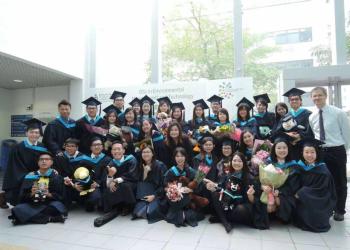
News
Let’s Have a Tea Party!
Recent news covered Chris Ko from the class of 2017 about her vegetarian tea cafe in Tsim Sha Tsui, and how she made good use of every skill she learnt from HKUST’s EVMT program to realize her dream.
“When I chose to apply to the Environmental Management and Technology (EVMT) program, I thought I would be learning about a wide range of environmental issues and their solutions,” said Chris. “But what’s more, I discovered what I wanted to do, and the program helped me achieved my goals.”
EVMT offers students a unique opportunity to grasp scientific and technological concepts and translate them into practice-based and sustainable business ideas. The intense, cross disciplinary program only admits 15 students every year, making it one of the most competitive degree programs in Hong Kong.
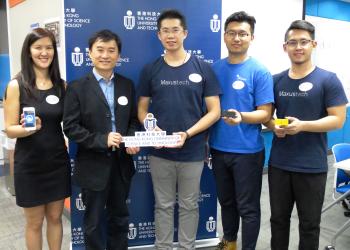
News
HKUST Holds the Seventh One Million Dollar Entrepreneurship Competition Winners Improve Life with Innovative Design
Over 900 teams comprising students, startups and professionals participated in the seventh annual One Million Dollar Entrepreneurship Competition organized by The Hong Kong University of Science and Technology (HKUST) in five cities this year, more than doubled over a year ago.
The Competition was first extended to Beijing, Guangzhou, Shenzhen and Macau last year. Prof Gary Chan, Director of the Entrepreneurship Center, said it is encouraging to see the Competition, originally an initiative to nurture entrepreneurs at HKUST, to have grown into a regional contest that helps cultivate entrepreneurial spirits and promote exchange of ideas across the border. “We have witnessed not only an increase in scale, but also rising quality of the submitted proposals and depth of market traction,” said Prof Chan. We are particularly excited to see a record-high industrial sponsorship to the event this year.”
2016
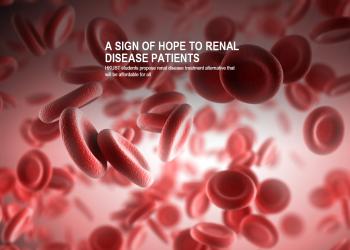
News
A Sign of Hope to Renal Disease Patients
Late stage renal disease is debilitating. When their kidneys stop functioning, patients are treated through dialysis that have serious physical side effects and are costly for many. But change may soon be coming—a team of HKUST students has invented a solution that uses graphene to reduce dialysis treatment time and costs, and enhance its effectiveness.
The team’s idea is simple yet previously untested. Dialysis usually filters out all blood impurities, but surface-modified graphene can trap targeted impurities, ensuring that vital salt and glucose are retained. As a result, life expectancy for patients should go up, and treatment time would also be greatly reduced.
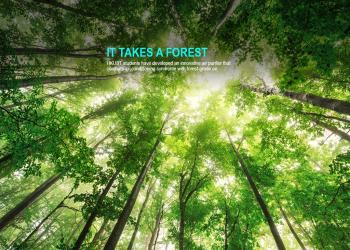
News
It Takes a Forest
Although air-conditioning is a blessing for office workers, it does have troublesome side effects. Carbon dioxide accumulates and oxygen levels drop in air-conditioned offices throughout the day, making it difficult to focus, promoting tiredness and generating anxiety.
Aware of this noxious situation, Dr Zhang Di (Ph.D., Bioengineering, 2014), and the founding members of NeoForest developed a 40 square meter photosynthetic air purifier. It uses microalgae instead of filters to purify air. The microalgae perform photosynthesis that generates oxygen and cleans up carbon dioxide and various air pollutants, which effectively combat the often-seen air conditioning syndrome in many offices that hinders the mind to think and respond.
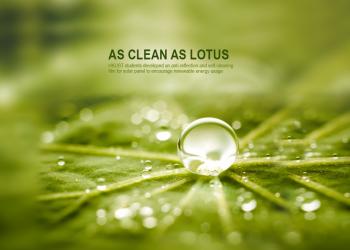
News
As Clean As Lotus
Solar Energy is well known as a mature technology for renewable energy, yet its popularity of daily life usage is low given its high set up and maintenance cost. A newly invented product by Sundial Technology may help to change this perception and encourage wider usage.
Formed by four HKUST students and advised by Prof Zhiyong Fan from the Department of Electronic and Computer Engineering, Sundial Technology invented an anti-reflection and self-cleaning film for solar panel. The self-cleaning feature is applied from “Lotus Effect”, where dirt particles are picked up by water droplets due to the micro and nanoscopic architecture on the surface. The team estimated the cleaning of dirty solar panels claims about HK$15.6 billion in monetary term and 90 billion kilowatt-hour of energy in Mainland China every year, They said the nanomaterialfilm they invented would offer a solution to such huge losses in cost and efficiency.
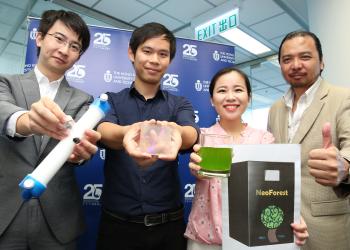
News
HKUST Holds One Million Dollar Entrepreneurship Competition in Five Cities for the First Time
The Hong Kong University of Science and Technology (HKUST) expanded its sixth annual One Million Dollar Entrepreneurship Competition from Hong Kong to a total of five cities this year. The Competition, which over the years has fostered the entrepreneurial spirit on the campus, motivated over 500 teams from Beijing, Guangzhou, Shenzhen, Macau and Hong Kong to join the contest.
As a forerunner to promote innovation and entrepreneurship, the Competition has eventually grown from a platform to nurture promising entrepreneurs at HKUST, into a regional contest that instills entrepreneurial culture and promotes exchange of ideas among young innovators across the border.
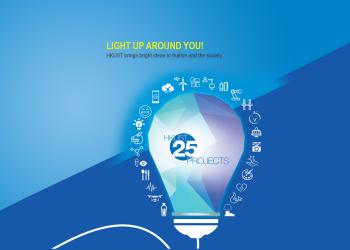
News
Light Up Around You!
As part of the 25th Anniversary celebrations, HKUST has selected 25 innovative ideas from faculty, staff and students. The venture embraces a wide array of topics, but all have in common the desire to improve lives, either for students on campus or in the world at large. Some have grown out of meticulous University research, while others are simple yet meaningful propositions.
These ideas range from developing an “Internet of Things” campus to a mood tracking app to improve student mental health; from an affordable green organic solar cells to replace toxic batteries to an empathetic robot that can have wide applications including assisting elderly or autistic children.
The website is now launched at http://hkust25projects.ust.hk, profiling each project in detail. Why not browse through, watch the videos and learn the benefits of each one –let’s contribute to the society together!
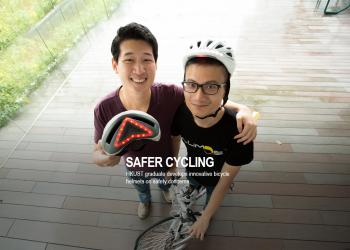
News
Safer Cycling
Wearing a bicycle helmet helps reduce severe head injuries or even save your life. With more people interested in cycling, a HKUST graduate invented a bicycle helmet with lights which provides greater
Jeff Chen Haoran, who graduated from the dual degree program in Mechanical Engineering and General Business Management at HKUST, developed a smart bicycle helmet with integrated turn signals and automatic brake lights. The helmet was co-designed with a partner he met during an exchange trip to Harvard University two years ago.
The smart bicycle helmet, “Lumos”, is designed to improve the safety and visibility of cyclists riding after dark. “Riding in HK is comparatively safe because there were a lot of well-designed bike trek. It is not the case in America as cyclist often need to mixed with the traffic and the drivers are not used to pay attention to them” Chen said.






